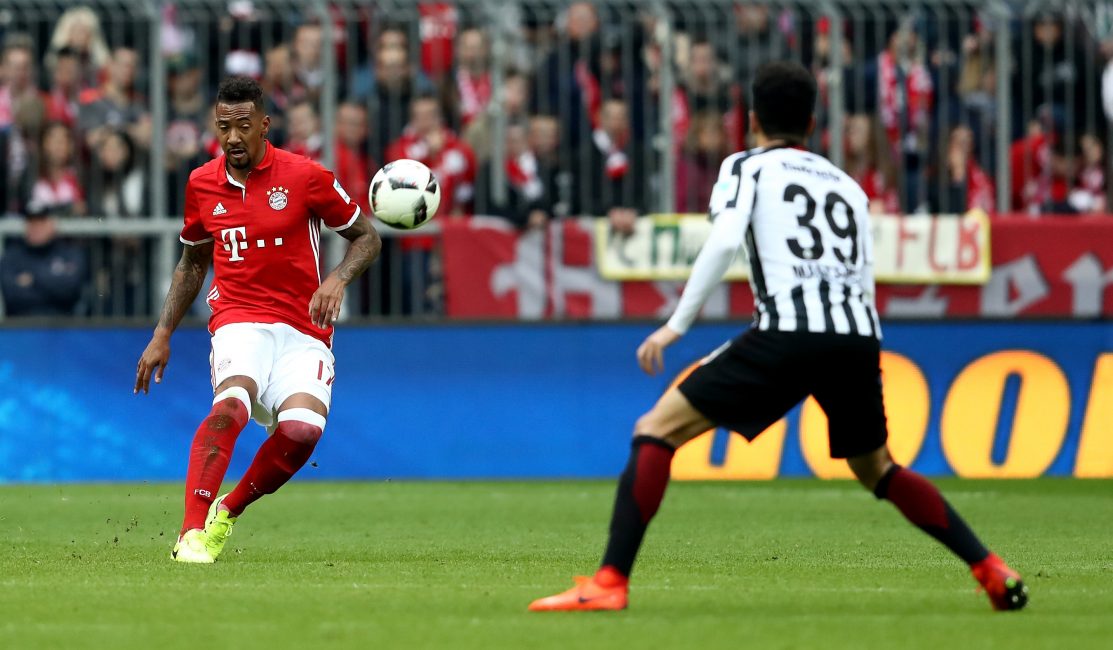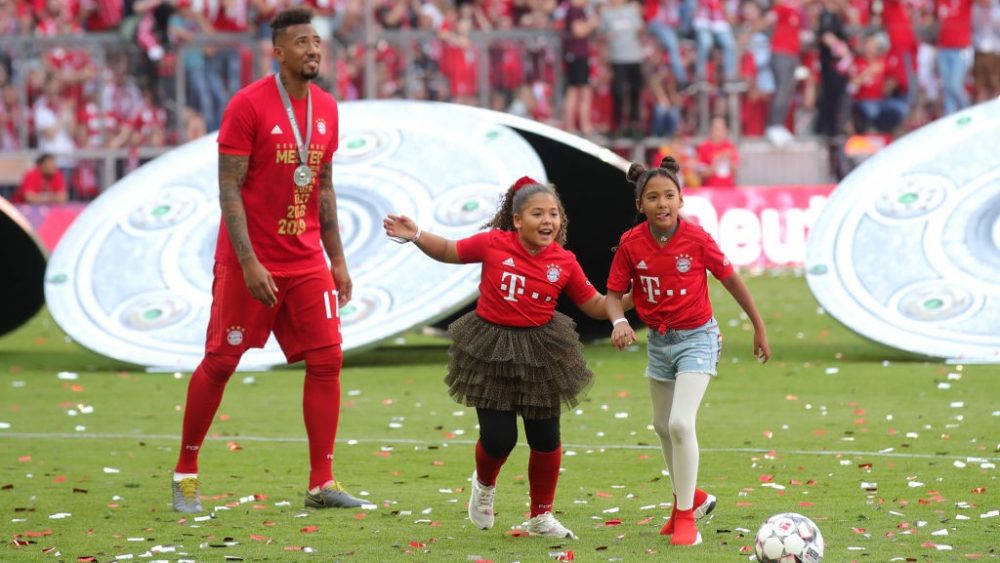Jérôme Boateng: the misunderstood quarterback?
While team, fans, and all involved celebrate themselves and the historical championship triumph, one player sits alone in the stand in which the trophy had been lifted into the air. Almost alone. Jérôme Boateng has his daughters around him. But he looks absent. Not unhappily absent, but at a distance from the actual events.
He takes more or less no part at all in his team-mates’ celebrations. Later in the evening he won’t be there when the party at Nockherberg goes rampaging on, either. His absence has already been signed off by the club. Boateng is taking part in his best friend’s wedding instead of celebrating the title.
Maybe the centre-back is just enjoying things quietly on Saturday afternoon. Hardly any intent can be read into his wedding plans. And yet you can’t shake the feeling that it was the last time that Bayern fans will see him shuffle across Munich grass in a Bayern shirt. It would be an undeserved departure for a hero who must have regularly felt misunderstood over the last months and years.
A big promise with question marks
When Jérôme Boateng came to Munich in 2011 for an estimated €13.5 million, he was no more than a talent. Via his home-town club Hertha BSC and Hamburg SV he went to Manchester City, where he played 24 competitive games, but missed the final step forwards for various reasons.
Bayern took the opportunity and were convinced that the Berlin-born player would ultimately fulfil his promise in the form of his giant talent in Munich.
Yet in the time under Jupp Heynckes some question marks remained. His nickname was “Bruder Leichtfuß”, meaning happy-go-lucky, because despite his great performances he constantly suffered lapses in concentration. Because in his career he also picked up one or two unnecessary cards and was too easy to provoke.
Rise to one of the best defenders in Bayern history
But Boateng worked himself hard. He developed under Heynckes to become a world class defender, whose moments of weakness became fewer and fewer. Fast, robust, strong in the tackle, agile, athletic and confident on the ball – Boateng established himself alongside defensive leader Dante as a key player.
He played 40 competitive games in the 2012/13 season. That campaign which will still be filling the history books with many pages in many years. In all of them, the story of Arjen Robben will be there. He was the goalscorer who ended a personal period of suffering. He was the big hero. Obviously, Lahm and Schweinsteiger will also be among the protagonists. Also not to be forgotten, among others, is Ribéry, whose back-heel assist is perhaps given less attention than the goal itself.
One person, however, gets only a passing mention just years later in 2019 when people think back on the Wembley goal: JérômeBoateng. He played the long, accurate ball forwards. He made no mistakes in the final and played just as a great player plays. He won 84% of his tackles and yet there will be no song that serenades his achievement at FC Bayern. The treble was just the start of his rise to the top.
Guardiola moulded him into a quarterback
Mit Pep Guardiola kam nur wenige Monate nach dem großen Triumph ein Trainer an die Säbener Straße, unter dem Boateng seinen bisher größten Karrieresprung schaffen sollte. “Als Guardiola nach München kam, hat er mir gleich ein paar Szenen vorgespielt und gesagt: Schau, diese Szene kann nicht sein als Abwehrspieler, diese Szene auch nicht,” sagte Boateng einst. Es sei ein “Best of dumme Fouls” gewesen.
In Pep Guardiola, just months after the great triumph a coach came to Säbener Straße under whose guidance Boateng would manage his biggest leap thus far. “When Guardiola came to Munich, he immediately played a few clips to me and said ‘Look, this can’t happen as a defender, not this one either’,” Boateng once said. Supposedly it was a “Best of stupid fouls”.
Yet the Catalan didn’t just teach him to successfully contest most of his challenges without sliding. Out of Boateng he made a playmaker who alongside Hummels led his national team to the World Cup in the summer of 2014. Boateng spoke to Sport Bild of how he was Guardiola’s quarterback. He distributed the balls and was responsible for opening the game well, he said.
In the
three years under Pep Guardiola, Boateng remained not just one of the best
tacklers in the league and in the world. He also pushed up his pass completion
rate to almost 90%, though the risk of his passes became ever bigger. This
discussion may be futile, but anyone claiming that between 2013 and 2016
Boateng was one of the best centre-backs of Bayern history has a few arguments
on their side.

(Image: Alexander Hassenstein/Bongarts/Getty Images)
Emotional distance
He was part of a larger development. In this decade, along with him some centre-backs developed to become playmakers from deep. Maybe none was as brilliant as Boateng. Maybe. In any case, he actively helped to define events from his position and set new standards. It’s not for nothing that he was given the nickname ‘Kaiser’. As Beckenbauer once, the Berliner shaped the game from all the way at the back.
If FC Bayern is searching for a central defender on the transfer market, they are looking for someone who can handle the ball. Ideally someone like Boateng. Only it becomes difficult to find someone like him again. The complete package of basics and these precise vertical games is rare.
In spite of it all, for quite a few Boateng will remain in the memory as a marginal figure. This phenomenon, hard to grasp, will have something to do with the developments in recent years above all. Many fans build up an emotional distance to him because they had the feeling that Boateng removed himself too much from football.
Self-inflicted dynamic?
Unusual style, his own magazine, a regular in the USA – even Karl-Heinz Rummenigge once called on him to come “back to earth”. This internal pot-shot, as well as the increasingly worsening performances after the 2016 Euros, took on their own momentum.
You almost want to say that it’s momentum that was self-inflicted. But is it? Do all these off-pitch activities mean that Boateng lost his focus on the fundamentals?
Who cares, for example, that Cristiano Ronaldo poses in underwear? Who cared that David Beckham did a gazillion other things outside football? Are Thomas Müller’s horses responsible when he doesn’t perform?
Nonsensical focus discussions
These arguments are simply plucked out of thin air and can’t be verified at all. It is, however, a fact that a great number of fans prefer if Giovane Elber has a ranch in Brazil or Müller deals with horses.
Fashion, some lifestyle magazine, social media activities and even parties are decried as activities that are out of touch with the real world and couldn’t correspond to the cliché of a footballer any less. They’re supposed weak points of a glamour player who would do well to come “back to earth” again. Fundamentally it’s no more than a smart second string to his bow that he’s developing at the end of his career. In fact it’s actually rather smart.
Boateng, in any case, has little to reproach himself. He’s had a great career and ultimately chosen a path that corresponds to his interests outside of sport. Whether those interests concur with those of the fans shouldn’t matter to him. It’s just a shame that in the evaluation of his performances an outsized role is given to whatever odd outfit he once wore somewhere or what magazine is published with his name. As if Boateng planned and carried out all of these activities alone.
Was it really a bad season?
If you look, however, at the sporting numbers of this Boateng season that is being called a disaster, you looks a little differently: 66% challenges won (Hummels 67%, Süle 69%), 89% passes completed (Hummels 89%, Süle 93%), 11 shot assists (Hummels 13, Süle 6), 2 assists (Hummels 1, Süle 0), 0.3 turnovers per game (Hummels 0.5, Süle 0.4), 0.6 times dribbled past per game (Hummels 0.7, Süle 0.2) – is that how a disastrous season reads?
Above all it’s individual moments that put Boateng’s year in a much too negative light. For example the penalty conceded in the first half of the season in Berlin and at Ajax or his behaviour against Düsseldorf in the 3:3. That players like Hummels, Thiago, Ribéry, Süle or Neuer, however, also make errors is often not mentioned. So isn’t it perhaps a question of how the team is set up? With 23.5 turnovers per game, Bayern had more than in the last five years in the Bundesliga.
A lot can be said for Boateng having gotten worse. Hummels has too, for example. With the former, however, his activities off the pitch seem to lead to few decisive mistakes lead to an exaggeration of his situation. An evaluation that is unfair in that form. Boateng’s injuries and lack of fitness in 2018 play a lesser role there than his magazine or his glasses.
An undeserved departure
Boateng was always someone who took a clear position and that expressed what was on his mind at any given moment. His constant battle against racism, his progression to a leader in the team, his humble but clear style in interviews – that’s exactly how he is in response to the things reported about him now. To the question about whether he has lost focus on football, he gave a clear no in response. Whether you want to believe him lies in the eye of the beholder.
But if you look back on his team at FC Bayern, there can scarcely be two opinions. Jérôme Boateng has decisively helped define an era where it matters: that is, on the pitch. It all looks as if he’ll go his separate way in the summer. If that should happen, the last matchday wouldn’t just reflect a fairy-tale that granted Robben, Ribéry and Rafinha wonderful final hours at the Allianz Arena.
It would also reflect a hero who is barely serenaded at all, who got an undeserved departure. Somewhat self-inflicted, somewhat for reasons that in the discussion about football sadly still receive far too much attention. But also of course because his departure still isn’t set in stone factually. And yet it edges closer. It hurts that Guardiola’s once superb quarterback and the pre-assist provider for the Wembley goal will probably have to sneak out the back door. Even if it makes footballing sense, the how is undeserved.








Excellent article. Well worth the read.
Brilliant article! Took me a while to come across this site, delighted i have so.